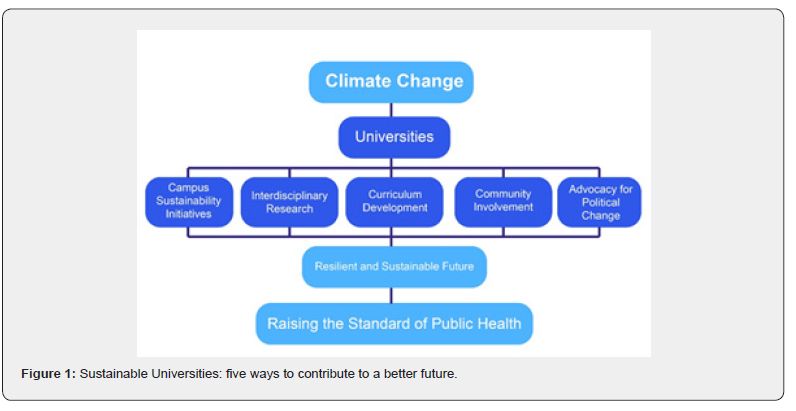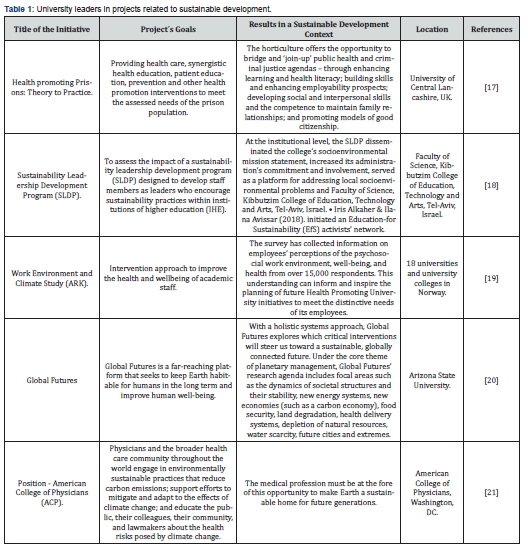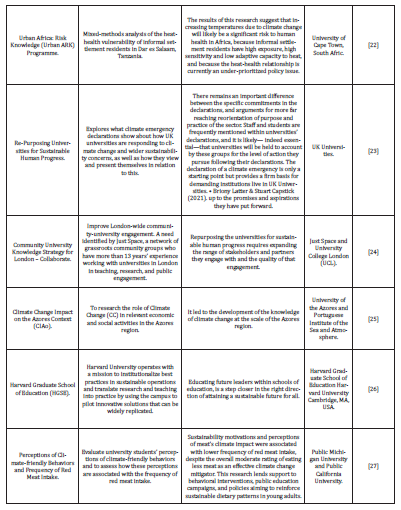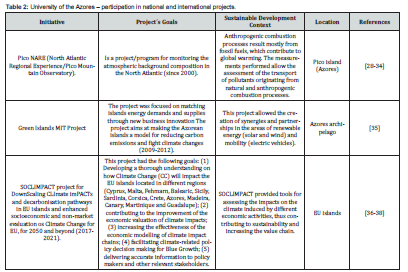Universities in Action: Innovative Strategies to Address Climate Change and Promote Health
Fernanda Carvalho1, Diamantino Henriques1, Cristina Vasconcelos2,3, Ana Ferreira2, and Maria Meirelles2,4,*
1Portuguese Institute of the Sea and Atmosphere, Portugal
2Department of Physics, Chemistry and Engineering Sciences, University of the Azores, Portugal
3Laboratory for Instrumentation, Biomedical Engineering and Radiation Physics(LIBPhys), Faculty of Science and Technology, Nova School of Science and Technology, Caparica, Portugal
4OKEANOS - Marine Sciences Research Institute, University of the Azores, Portugal
Submission: August 06, 2024; Published: August 20, 2024
*Corresponding author: Maria Meirelles, Department of Physics, Chemistry and Engineering Sciences, University of the Azores, Ponta Delgada, 9500-321, Portugal
How to cite this article: Fernanda C, Diamantino H, Cristina V, Ana F, Maria M. Universities in Action: Innovative Strategies to Address Climate Change and Promote Health. Int J Environ Sci Nat Res. 2024; 34(1): 556378. DOI: 10.19080/IJESNR.2024.34.556378
Abstract
Climate change has a strong global impact, and we are already experiencing this. Scientists are working hard to find innovative sustainable solutions to our problems. Climate change education is a recent expanding phenomenon that is becoming increasingly relevant in the activities of international governmental and non-governmental organizations, with an emphasis on improving public well-being and health. Overall, universities have a crucial role to play in addressing the connections between climate change and health. By taking proactive steps to promote sustainability, facilitate research and education, engage communities and advocate for policy change, universities can help build a more resilient and sustainable future for all.
Through the research carried out, we emphasize the importance of an integrated approach that combines education, research, community engagement and policy advocacy to address current environmental challenges and promote a more sustainable future. The systematic review process described in the article ensures that the findings are based on a comprehensive analysis of relevant literature and projects. This methodological process ensuring that the strategies discussed are well-supported by evidence.
Keywords: Climate change; Health; Universities leaders
Introduction
We highlight the role of universities in promoting sustainability and combating climate change, addressing five essential steps: integrating sustainability into curricula, promoting interdisciplinary research, community engagement, implementing sustainable practices on campus and influencing public policies, Figure 1.
These steps to promote sustainability are purposed and explained by several authors:
i. Campus sustainability initiatives: Universities can take steps to reduce their own carbon footprint and promote sustainability on campus. This can include initiatives such as renewable energy installations, waste reduction and recycling programs, and sustainable transportation options [1,2].
ii. Interdisciplinary research: Addressing the complex challenges of climate change and health requires a multidisciplinary approach. Universities can facilitate collaboration between researchers in fields such as environmental science, public health, and social science to develop innovative solutions [3,4].
iii. Curriculum development: Integrating climate change and health topics into university curricula can help prepare the next generation of leaders to address these issues. This can involve developing new courses or modifying existing ones to include these topics [5,6].
iv. Community engagement: Universities can engage with their local communities to promote awareness of the health impacts of climate change and develop partnerships to address these issues. This can include working with local health departments, community organizations, and government agencies [7,8].
v. Policy advocacy: Universities can play a role in advocating for policy changes that address the root causes of climate change and its health impacts. This can involve supporting local and national policies that promote sustainability and public health, as well as engaging with policymakers to promote evidence-based decision-making [9].

Recognizing the importance of a sustainable future, many institutions are implementing a variety of policies and initiatives that not only benefit the environment but also serve as educational models for their students and communities. According to [10] as cited by the United Nations Framework Convention on Climate Change (1992), “Education is an essential element for mounting an adequate global response to climate change” [11]. The most compelling demands for climate change education come from medical students themselves, as they anticipate the uncertainties of future practice in a rapidly changing world [12]. And continuing with the same citation, at Stanford University School of Medicine, medical students requested, codesigned, and helped to implement a new elective course in 2020, entitled The Impact of Climate Change on Human Health. The course examines the intersection of climate change and population health, pediatrics, women’s health, psychiatry, infectious disease, and disaster management, along with advocacy and the greening of health care. According [13], students from across the university have enrolled in the course and transforming generation: Increasing student awareness about the effects of economic decisions on sustainability. [14] said that education for sustainable development has become increasingly important for higher education institutions and societies in general during the past three decades and thus, has created a more complex environment for operating a higher education institutions. [15] the role of universities in climate change education is of great importance if the scientific, social, environmental and political challenges the world faces are to be met. [16] says that education is the driving force of establishing sustainability since it is one of the main communication vehicles and the basis for the “sustainability mindset”. This concept includes “a systemic approach to understanding, one which goes beyond technical knowledge and even understanding the basics of a healthy ecosystem and a thriving society". The collaborative efforts of academic institutions, students, and communities in promoting sustainable practices and policies are essential for driving systemic change. As the global response to climate change intensifies, the educational sector's commitment to sustainability will be crucial in shaping a resilient and sustainable future for all.
Methodology
We conducted a systematic search of titles in two databases, Web of Science and Scopus, covering the period from January 1, 2002, to December 31, 2022. The search strings used included combinations of terms related to 'climate change', 'health', 'interdisciplinary research', and 'university leaders', using Boolean operators (AND, OR) for comprehensive results. Additionally, we searched university repositories and project websites for relevant literature on sustainable development projects led by universities.
The inclusion criteria were articles published in peer-reviewed journals, studies focusing on the intersection of climate change, health, and higher education and publications in English. The exclusion criteria were articles not available in full text and studies not directly related to the core themes.
The screening process involved two reviewers independently screening titles and abstracts, followed by a full-text review of selected articles. Discrepancies were resolved through discussion. Data extraction focused on study aims, methods, key findings, and relevance to the research objectives. The extracted data were synthesized qualitatively to identify common themes and insights.
Results and Discussion
Inspiring projects around the world
Around the world, there are already several inspiring projects from universities leaders in the area innovative strategies to address climate change and promote health (Table 1).


The topics covered in Table 1, are diverse but all related to sustainability, health, and well-being. Overall, these topics illustrate the importance of sustainability, health, and well-being in various settings and highlight the need for interventions in education, research, and collaboration to address these critical issues. So, it is necessary to have a holistic approach that incorporates interdisciplinary research, community engagement, education and public policies.
By educating and training leaders in sustainable practices, universities ensure that future generations are better prepared to make informed and responsible decisions. By promoting interdisciplinary research, we are often driving innovation, resulting in more effective solutions to environmental challenges, benefiting both academia and industry. Partnerships between universities and local communities can lead to more effective sustainability initiatives tailored to the specific needs of the community. Universities that implement sustainable practices on their campus serve as a practical and motivational example for other organizations, demonstrating that sustainability is attainable and beneficial. By contributing to the formulation of public policies, universities can help create an ecosystem that favors sustainability at a national and international level. Implications such as those referenced highlight the importance of an integrated and multifaceted approach to promoting sustainability across universities.
Inspiring projects - case study - Azores
The University of the Azores (UAc) has a long tradition of participation in national and international projects, especially in the field of climate and environmental sciences of which the following are examples:
(i) Rethink Action is funded under the Horizon 2020-EU.3.5 Programme; the project brings together thirteen partners from nine countries, combining various fields of expertise such as social sciences, political science, land use-based policy, environmental sciences, atmospheric sciences, ICT modelling, integrated assessment modelling, earth observation, climatology and communication (Rethink Action, 2021); (ii) (SOCLIMPACT, 2017), project for DownScaling CLImate imPACTs and decarbonisation pathways in EU islands and enhanced socioeconomic and non-market evaluation of Climate Change for EU, for 2050 and beyond (Soclimpact, 2020); (iii) (Green Islands MIT Project, 2009), focused on matching islands energy demands and supplies through new business innovation and (iv) Pico NARE (North Atlantic Regional Experience/Pico Mountain Observatory ) (since 2000) is a project/program for monitoring the atmospheric background composition in the North Atlantic (Pico NARE, 2000). Local and national partnerships with the Portuguese Institute for the Sea and Atmosphere and other public institutions especially linked to health are also relevant, as is the CIAo (Climate Change Impact on the Azores Context) action Table 2.


The integration of topics related to Climate Change and the Environment in the curricula of the various courses at universities is a reality, and also a concern in the curricula at UAc. These disciplines are taught by specialists in each specific area, and students are encouraged to deepen their investigation. From social sciences to economics, from technologies to agricultural sciences, from biology to biomedical sciences, the impacts of Climate Change, its mitigation and adaptation are addressed in the context of the Azores. Since 2022, UAc has been developing specific projects of environmental research and/or climate change related to human health, namely the study of respiratory and cardiovascular diseases.
UAc maintains partnerships with regional health units in the scope of research on the effects of atmospheric variables (meteorology/climate and atmosphere composition) on human health. The impact of atmospheric factors on human health or, if we want to be more specific, their effective contribution in triggering and exacerbating certain diseases, has been increasingly the target of scientific research for different locations and with diverse methodologies, gaining special importance with Climate Change. So, and in the area of health and human welfare the UAc has been working with a focus on the following proposals for future actions: (i) promote an evaluation study of the indoor environmental conditions in closed spaces (day-care centers, schools, homes, residences) in the context of the Climate Change expected for the Azores region; (ii) develop studies to clarify the mechanism of the interrelationship between environmental determinants to identify high-risk groups and key environmental factor exposures; (iii) contribute to raising awareness among the population to reduce exposure to potential respiratory disease exacerbates; (iv) contribute to improving management of the hospital admission process; (v) contribute to the design of a possible environmental alert system for some (respiratory and cardiovascular) diseases; (vi) proposing new research projects in the areas of (a) exposure of workers to UV radiation, and (b) atmospheric iodine.
The Azores University participates (scientific research and technical scientific advice) in the development and application of sustainability policies in the Azores region, in relevant areas such as energy transition, land use, fisheries, agriculture or biodiversity; supports and promotes workshops, symposia and conferences to promote sustainability, public health, environment, circular economy and all socio-economic policies that contribute to Planetary Health. So, it is necessaire a holistic approach that incorporates interdisciplinary research, community engagement, education and public policies. Also, the article emphasizes the need for a multidisciplinary approach to tackle complex challenges. This includes collaboration between environmental science, public health, social science, and other fields, which is an innovative method for creating comprehensive solutions.
By presenting real-world examples and case studies from different universities around the world, the article provides practical insights and innovative strategies that have been successfully implemented. This includes projects like the Work Environment and Climate Study (ARK) in Norway and the Global Futures project at Arizona State University. Highlighting the role of universities in advocating for policy changes and engaging with local communities is a novel aspect. This approach not only promotes sustainability but also helps in educating and involving the public in climate change initiatives, which can lead to more effective and sustainable outcomes.
Conclusion
This article explores the crucial role of universities in promoting sustainability and combating climate change. Through a comprehensive analysis, it identifies five essential steps that higher education institutions can adopt: integrating sustainability into their curricula, promoting interdisciplinary research, engaging with the community, implementing sustainable campus practices, and influencing public policies. Examples of successful initiatives, such as the Sustainability Leadership Development Program and the Health Promoting Prisons initiative, are discussed to illustrate how universities are leading the change. Some recommendations to enhance university engagement on climate change and promote health are that universities should:
a) promote a culture of environmental responsibility
b) encourage interdisciplinary research to improve the resolution of complex challenges
c) advocate and support reforms or new public policies aligned with environmental and health concerns.
The article concludes by emphasizing the need for a holistic approach, combining education, research, community engagement, and policy advocacy to address contemporary environmental challenges and create a more sustainable future.
References
- Cortese AD (2003) The critical role of higher education in creating a sustainable future. Planning for Higher Education 31(3): 15-22.
- Leal Filho W, Shiel C, Paço A (2016) Implementing and operationalising integrative approaches to sustainability in higher education: the role of project-oriented learning. Journal of Cleaner Production 133: 126-135.
- Costello A, Abbas M, Allen A, Ball S, Bell S, et al. (2009) Managing the health effects of climate change: Lancet and University College London Institute for Global Health Commission. Lancet (London, England) 373(9676): 1693-1733.
- Holm P, Goodsite ME, Cloetingh S, Agnoletti M, Moldenhauer G, et al. (2013) Collaboration between the natural, social and human sciences in Global Change Research. Environmental Science & Policy 28: 25-35.
- Sterling S (2010) Transformative learning and sustainability: sketching the conceptual ground. Learning and Teaching in Higher Education 5(11): 17-33.
- Barth M, Godemann J, Rieckmann M, Stoltenberg U (2007) Developing key competencies for sustainable development in higher education. International Journal of Sustainability in Higher Education 8(4): 416-430.
- Bringle RG, Hatcher JA (2002) Campus–community partnerships: The terms of engagement. Journal of Social Issues 58(3): 503-516.
- Maurrasse DJ (2001) Beyond the Campus: How Colleges and Universities Form Partnerships with their Communities (1st edn), Routledge, UK, p. 224.
- Bell ML, Ebisu K (2012) Environmental inequality in exposures to airborne particulate matter components in the United States. Environmental Health Perspectives 120(12): 1699-1704.
- Cordero EC, Centeno D, Todd AM (2020) The Role of Climate Change Education on Individual Lifetime Carbon Emissions. PLoS ONE 15(2): e0206266.
- United Nations (1992) United Nations Framework Convention on Climate Change. New York: United Nations, General Assembly.
- Goshua A, Gomez J, Erny B, Burke M, Luby S, et al. (2021) Addressing Climate Change and Its Effects on Human Health: A Call to Action for Medical Schools. Academic Medicine 96(3): 324-328.
- Sierra J, Ángela Suárez-Collado (2021) The transforming generation: increasing student awareness about the effects of economic decisions on sustainability. International Journal of Sustainability in Higher Education 22(5): 1087-1107.
- Giesenbauer B Müller-Christ G (202) University 4.0: Promoting the Transformation of Higher Education Institutions toward Sustainable Development. Sustainability 12(8): 3371.
- Molthan-Hill P, Worsfold N, Nagy GJ, Leal Filho W, Mifsud M (2019) Climate change education for universities: A conceptual framework from an international study, Journal of Cleaner Production 226: 1092-1101.
- Žalėnienė I, Pereira P (2021) Higher Education for Sustainability: A Global Perspective. Geography and Sustainability 2(2): 99-106.
- Baybutt M, Chemlal K (2016) Health-promoting prisons: theory to practice. Global Health Promotion 23(1_Suppl): 66-74.
- Alkaher I, Avissar I (2018) Assessing the impact of a program designed to develop sustainability leadership amongst staff members in higher education institutes: a case study from a community of practice perspective. Environmental Education Research, 24(4): 492-520.
- Innstrand ST, Christensen M (2018) Healthy Universities. The development and implementation of a holistic health promotion intervention programme especially adapted for staff working in the higher educational sector: the ARK study. Global Health Promotion 27(1): 68-76.
- Ryan A, Crowley BSJ, (2016) Change and Health: A Position Paper of the American College of Physicians. Annals of Internal Medicine 164(9): 608-610.
- Crowley R, Mathew S, Hilden D, Health and Public Policy Committee of the American College of Physicians (2023) Modernizing the United States' Public Health Infrastructure: A Position Paper from the American College of Physicians. Annals of internal medicine 176(8): 1089-1091.
- Pasquini L, van Aardenne L, Godsmark CN, Lee J, Jack C (2020) Emerging climate change-related public health challenges in Africa: A case study of the heat-health vulnerability of informal settlement residents in Dar es Salaam, Tanzania. Science of the Total Environment 747: 141335.
- Latter B, Capstick S (2021) Climate Emergency: UK Universities' Declarations and Their Role in Responding to Climate Change. Front Sustain, Sec. Sustainable Organizations Volume 2.
- Bell S, Lee R, Fitzpatrick D, Mahtani S (2021) Co-producing a Community University Knowledge Strategy. Front. Sustain., Sec. Sustainable Organizations Volume 2.
- Carvalho F, Martins D, Meirelles M, Vasconcelos H (2022) Weather and Air Quality Factors Contribution to the Hospital Admissions of Patients with Respiratory Diseases: Case Study of Faial Island (Azores). Int J Environ Sci Nat Res 31(1): IJESNR.MS.ID.556305.
- Nam AH, Lee S (2021) Students as Partners. Implementation of Climate Change Education Within the Harvard Graduate School of Education. In Education and Climate Change the Role of Universities. Chapter 6, Springer, ISBN 978-3-030-57927-2, pp. 153-180.
- Slotnick MJ, Falbe J, Cohen JEW, Gearhardt AN, Wolfson JA, et al. (2023) Environmental and Climate Impact Perceptions in University Students: Sustainability Motivations and Perceptions Correspond with Lower Red Meat Intake. Journal of the Academy of Nutrition and Diebetics 123(5): 740-750.
- Bhandari J, S China, KK Chandrakar, G Kinney, W Cantrell, et al. (2019) Extensive Soot Compaction by Cloud Processing from Laboratory and Field Observations, Scientific Reports 9(1): 11824.
- Schum SK, Zhang B, Dzepina K, Fialho P, Mazzoleni C, et al. (2018) Molecular and physical characteristics of aerosol at a remote marine free troposphere site: Implications for atmospheric aging, Atmospheric Chemistry and Physics 18(19): 14017-14036.
- Coen M, Andrews E, Aliaga D, Andrade M, Angelov H, et al. (2018) Identification of topographic features influencing aerosol observations at high altitude stations. Atmospheric Chemistry and Physics 18(16): 12289-12313.
- China S, Alpert P, Zhang B, Schum S, Dzepina K, et al. (2018) Ice cloud formation potential by free tropospheric particles from long-range transport over the Northern Atlantic Ocean. Journal of Geophysical Research – Atmospheres 122(5): 3065-3079.
- China S, Scarnato B, Owen RC, Zhang B, Ampadu MT, et al. (2017) Morphology and mixing state of aged soot particles at a remote marine free troposphere site: Implications for optical properties. Geophysical Research Letters 42(4): 1243-1250.
- Dzepina K, Mazzoleni C, Fialho P, China S, Zhang B, et al. (2015) Molecular characterization of free tropospheric aerosol collected at the Pico Mountain Observatory: a case study with a long-range transported biomass burning plume. Atmospheric Chemistry and Physics 15(9): 5047-5068.
- Helmig D, Munoz M, Hueber J, Mazzoleni C, Mazzoleni L, et al. (2015) Climatology and atmospheric chemistry of the non-methane hydrocarbons ethane and propane over the North Atlantic. Elementa Science of the Anthropocene 3: 000054.
- Carvalho F, Diamantino H, Paulo F, Elsa V, Jorge S (2010) Evaluation of Solar Energy Potential and its Variability in the Azores, MIT-Portugal Program | Green Islands Project, University of Azores Research Areas.
- Ahrens B, Leps N (2021) Sensitivity of Convection Permitting Simulations to Lateral Boundary Conditions in Idealised Experiments. Earth and Space Science Open Archive.
- Lam-González Y, Galindo CG, Hernández MMG, León CJ (2020) Understanding the Heterogeneity of Tourists’ Choices under Climate Change Risks: A Segmentation Analysis. Atmosphere 12(1): 22.
- León CJ, Lam-González YE, Galindo CG, Hernández MMG (2020) Measuring the Impact of Infectious Diseases on Tourists’ Willingness to Pay to Visit Island Destinations. Atmosphere 11(10): 1117.
- Carvalho F (2010) Climate Change Impact in the Azores context (CIAo).






























